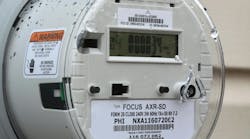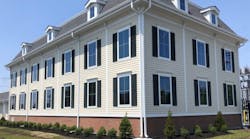Mack is a deliberate, opinionated and, might I say, demanding man. But he is more than that. This is the man who crafted the concept, developed the plans, solicited the work and built the facilities that launched the Georgia Power Research Center (now NEETRAC), where I had the privilege to work for 20 years. Mack, you are one of the greats of our industry, and I owe a lot to you.
But it took a while to get a shot at working for Mack. I started in the bullpen on the 19th floor of the 270 Peachtree building in Atlanta, Georgia, running errands and updating manufacturers’ specification books for the staff engineers. All the while, another co-op student, Rick Hartlein, was doing real work for an engineer by the name of Mack Martin. Rick was driving around in a company car, cutting off samples of underground cable from large reels of 1/0 and 1000 kcmil aluminum conductor, and bringing them back to the office to test for voids and contaminants.
When work expanded to the point that Mack was doing cable aging and short-circuit testing out of a double-wide trailer at the general services headquarters in Forest Park, Georgia,
I jumped at the chance to join him.
Mack was the first person I ever worked for who really invested himself in me. This was the first time I experienced that bond between a mentor and protégé. And Mack was loyal. I remember when the company decided to cut back on all co-op students who had worked more than five quarters. Mack went up the chain of command to keep me on. Of course, he had a good reason; he had a signed EPRI contract I was working on. Wow, did I feel wanted and needed.
I wouldn’t describe Mack as a kinder, gentler man. He pushed us hard, but always with cause. I like that in a boss. Mack expected us to walk on water. He gave us our own projects, and he backed us with the support we needed to make things happen.
My first solo project as a co-op student was to look at the impact of wind and solar radiation on the dynamic ambient temperature of padmount transformers. From there, projects continued to get more sophisticated. Mack supported me in going back to get a master’s degree, even letting me slip out during the day to take classes.
Like I said, he invested in us. He sent me off to public speaking classes so I could represent us well when I was given the chance to present at the IEEE T&D Expo.
Mack kept proving the value of research, and we soon found ourselves in a real brick building with mechanical and electrical testing facilities. I have always shown an ability to get dirty and soon found myself in the soil lab working on my master’s thesis to predict thermal drying of soils in the vicinity of underground cables. I then went on to develop flowable fills using fly ash as a fluidizing agent.
Mack ultimately brought Rick and me on as engineers, and we even found ourselves mentoring co-op students, including Jay Sport, Glen Wells and Bob Gaffney.
Of course, with a bunch of young brash engineers and immature co-op students, the hijinks were always flowing. Mack was a bit of a hypochondriac, and I found an opportunity to turn this trait against him.
One morning, when he was being particularly obtuse, I came up with the scheme to send an engineer into his office and say, “Mack, are you feeling all right? You don’t look well.” And the next person who went into his office said, “Mack, did you get any sleep last night? You look really tired.” After the next remark, “Your voice sounds really gravely,” off went Mack to see the doctor. (To my knowledge, the first time Mack will have heard about this stunt is when he reads this editorial.)
I loved and hated it when Mack went to industry meetings. For example, when Mack came back from an IEEE Insulated Conductors Committee meeting, he would return with more work and tighter deadlines than I thought could be pulled off. But once engrossed, I forgot about the deadlines and the work flowed out. I even had the great opportunity to assist in the writing of the “IEEE Guide for Soil Thermal Resistivity Measurements.” How cool is that?
Another time, Rick, Ray Hill and I performed short-circuit tests on primary cables exposed to traditional breaker sequences. We found out that the cables cooled off considerably during off-cycles, enabling the engineers to reduce the amount of concentric neutral from full neutral to 1/6 neutral.
To this day, I can’t imagine what Mack first saw in me. Mack will readily admit the material was raw. I was a punk and had way more confidence than I had any right to exhibit.
I still keep up with Mack, 30 years later, and Mack keeps up with me. Mentor men do that, they continue to check in on their protégés.
Today, utilities seem to be running too lean to give us the opportunity to mentor those coming up. Take the time anyway. You will make an eternal difference in some young person’s career. Thank you, Mack, for the man you are and the man you helped me to become.

